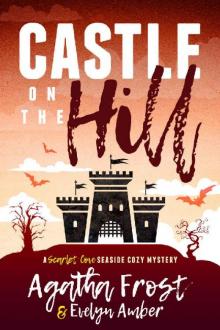- Home
- Agatha Frost
Vanilla Bean Vengeance (Claire's Candles Cozy Mystery Book 1) Page 6
Vanilla Bean Vengeance (Claire's Candles Cozy Mystery Book 1) Read online
Page 6
She’d taken only three steps before the slamming of a heavy metal door around the left side of the factory made her jump. She detoured towards the sound, surprised to see someone stomping down the fire escape. It took Claire a second to figure out where the door opened on the other side, but after checking the windows, it could only have been in one of the rooms connected to Nicola’s, or rather Ben’s, office.
One mystery solved.
Claire’s father had wondered how Nicola’s murderer could have fled the factory without passing everyone below. She had forgotten all about the disused intricate system of fire escape staircases around the sides of the building.
As he reached the bottom, she recognised Graham, Nicola’s husband, and her parents’ next-door neighbour. To Claire, Nicola had always seemed glamorous and rather snobbish, and she’d thought Graham looked too square for his late wife. He was short, skinny, balding, and cared far too much about bird watching and gardening for a man in his early forties.
The rage twisting his expression as he marched across the car park to his silver Ford Focus, startled her; she had never seen him angry before. He was usually so placid, always with a smile and wave for his neighbours – unlike his late wife. Today, however, he walked right past Claire without giving her a second look.
Returning to work, Claire wondered if it was possible Graham could have been in the factory on the afternoon of Nicola’s murder. It wasn’t difficult for Claire to conjure up an image of Graham sneaking up the fire escape and catching his wife kissing Jeff.
Adultery, according to her father, was one of the most common motives for impulsive murder, and nothing screamed impulsive more than being pushed through a window from a great height.
One motive. Three suspects. Three angles.
Graham.
Jeff.
Belinda.
Chapter Six
William Warton had always kept things simple at the factory. Everyone worked nine to five, Monday to Friday. As repetitive as it was, it was reliable. No one ever needed to check the rotas because nothing ever changed. The whispering about cutbacks started before his body was even in the ground.
“Nicola’s been the accountant here for years,” the gossips said. “She cares about the numbers, not our lives.”
On a rainy Monday at the back end of the previous year, a heart attack killed William while he sat at his desk. The doors of the factory remained closed until the following Monday. Everyone expected sweeping changes from the moment Nicola appeared for her first shift as boss, but nothing changed.
“Maybe she’s not so bad?”
“Things work fine as they are, don’t they?”
“No point rocking a steady boat, right?”
For the first two weeks, things stayed as they had always been – but then the dreaded Friday afternoon came. Nicola descended the metal stairs as everyone was about to pack up for the week. She stood halfway up, and in her calmest voice, announced she was cutting the five-day workweek to a four-day workweek.
“It means more flexibility,” she had said, looking around but making no eye contact. “You’ll have more time during the week to do the things you enjoy, and there will be opportunities for overtime.”
William treated his employees like his neighbours, his family. Nobody was ever scared to knock on his office door. In fact, he preferred if you just walked in without bothering with the formality.
If you needed time off for an appointment, you got it. If you needed an advance every few months, you got it. If you had ideas about how things could be run better, he wanted to hear them.
That all ended with Nicola. They were forced to sign zero-hours contracts. Hours were slashed. The workload increased. A handful walked out. Most couldn’t afford to.
That’s when people started referring to her as the Warton Witch.
“It’s just the way things are now,” Nicola would say if anyone dared complain. “The world of work has changed. Get used to it.”
And somehow, they did. Checking the rotas every second Sunday became a habit. The group chat was set up so people could swap shifts if they were forced to work a Saturday, and they couldn’t arrange childcare. Without a boss to look out for them, they looked out for each other. Things settled into a new rhythm, and even though everyone had less money, they stuck together.
Nicola’s murder changed everything all over again. When Ben turned up in his dapper suit and smarmy smile after a week of uncertainty, some of the talk in the group chat after his pub performance was hopeful.
“Maybe he’ll put things back to how they used to be?”
“Things can’t get any worse, can they?”
The rest remained silent. Nobody wanted to be the one to say Ben was going to make things worse, but after the disastrous first shift, how could things not be getting worse? On Sunday night, the factory phone system sent a text message to all employees.
New rotas online now. Effective immediately.
Nicola’s changes had been like swallowing sand. Ben’s changes, on the other hand, were more like trying to swallow knives sideways. The four-day workweek had been slashed to three, with some only getting two shifts for the whole week. The shifts had turned from eight hours to twelve.
“How can I afford my rent now?”
“How can I afford my mortgage with these hours?
“How can I pay for my childcare?”
“How is this fair?”
“How is this legal?”
Claire couldn’t remember the last time she hadn’t worked on a Monday morning outside of bank holidays, but standing outside the empty tearoom in the quiet village square, her hours slashed like everyone else’s, she was glad not to be there today. Some had tried to incite protests, but Claire knew the people she worked with better than that.
Few could risk being fired now, of all times. They would keep their heads down and work. The atmosphere would be foul, but they’d put up and shut up. After all, they had signed Nicola’s new contracts.
Claire pulled away from the empty tearoom, unable to torture herself for another second. She glanced at the ‘TO LET’ sign poking out from the old stone wall, knowing it could come down at any time.
Would someone open a new tearoom? Or perhaps a sandwich shop? Or maybe the candle shop of Claire’s dreams under someone else’s management?
What a cruel twist of fate that would be.
The empty tearoom was one of five shops on the row. Brown’s Butchers was on the right-hand corner, with Wilson’s Green Grocers next door. Jane’s Tearoom had been right in the middle of the row, with The Abbey Friar fish and chips shop to its left. Northash Post Office, which happened to be where her mother had worked coming up on forty years, completed the row on the left corner.
Once simply a post office, the decline in traditional mail had forced the business to adapt. It was now more of a convenience corner shop that happened to have a small post office counter in it. It was the only place in the village where you could send a letter, cash in your pension, and buy a newspaper, a pint of milk, and a bar of chocolate all in one go.
Chocolate.
Chocolate would help.
Claire walked into the post office. There used to be a single long counter for four workers on the far wall, with an area for organised queuing in neat lines taking up the rest of the space. Now it had two separate counters, one for the shop and one for the post office.
Four decades at the shop had seen Janet promoted to manager, not that she seemed to do much. Even in a rural village like Northash, few people sent letters these days. She’d serve the odd customers sending back ill-fitting clothes bought online and help fill out passport forms, but she usually spent her days reading newspapers and barking orders at the one other staff member of the day.
Jessica Kent, the fresh out of college eighteen-year-old, had only lasted three months, and now they were onto Leo Wilkinson, a twenty-two-year-old with a nervous disposition and mild acne.
“Hello, Claire,”
Leo said, his cheeks blushing maroon. “Having a nice day, Claire?”
“Splendid.”
“Shouldn’t you be at work?” Behind the plastic window of her separate post office booth, Janet snapped shut the latest issue of the Northash Observer. “Don’t tell me you’re bunking off, dear.”
“I’m not fourteen anymore.”
“The trouble we had with you!” Janet pulled off her chained reading glasses. “You and Sally did a disappearing act every P.E. lesson for five years straight. I’m surprised they didn’t expel you.”
“I’m allergic to exercise, remember?” Claire walked straight up to the row of shiny foil-wrapped chocolate bars. “And before you say anything, yes, I’m buying chocolate, and no, you can’t stop me.”
“Why would I say anything, dear?” Janet re-opened the newspaper, brows raised halfway up her forehead. “It’s your life, or so you keep telling me. I worry about you, that’s all.”
Claire spotted Nicola’s unsmiling face on the cover of the latest issue of the Northash Observer when her mother folded the paper in half to continue her reading. Rather than a dramatic headline relying on alliteration and shock, they’d simply gone for:
Nicola Warton
January 23rd, 1980 – March 24th, 2020
Claire had read the article beginning to end that morning over her corn flakes, but there wasn’t much to learn. Nicola grew up wealthy; studied mathematics at Oxford University, where she met Graham; moved back to Northash to work at the factory; married Graham; took over the factory when her father died; and was murdered. She had no children and, outside the family business, did nothing all that extraordinary with her life.
And yet, the paper had tried their very best to make Nicola sound like a beloved local hero. Funnily enough, they’d included no quotes from anyone who worked at the factory under her leadership.
Claire wondered how Graham would feel at seeing the paper ignore her married name. She had technically been Nicola Hawkins for two decades, and yet people had referred to her as Nicola Warton as much in life as death. Graham hadn’t provided a quote for the article either, although it was said that he was asked and refused.
The journalist speculated that ‘the poor man was too stricken with grief to talk owing to the tragic nature of his dear wife’s death.’ He hadn’t been too stricken with grief not to spend most of Friday arguing with Ben Warton in the office his ‘dear wife’ had been pushed from.
Ben’s trial and prison sentence were mentioned in passing, but it felt like they were trying to add extra column inches to the already bloated issue by the time his name came up.
The article ended with a quote from Detective Inspector Harry Ramsbottom’s promise that the police were ‘dedicated to catching Nicola’s callous killer’ and ‘exploring many promising leads.’ They expected ‘an arrest very soon’ but refused to comment or speculate any further.
Claire knew it meant they were no closer to figuring things out than she was.
“Glenda’s daughter joined that new slimming group at the church hall.” Janet flipped the page. “She’s lost a stone already. Got a little award for it and everything.”
Claire ignored her mother and turned her attention to the chocolate.
Dairy Milk or Galaxy?
Or both?
“Apparently, according to Glenda, you don’t have to cut anything out either,” Janet continued, glancing at Claire over the top of her reading glasses. “It’s all about colours and points. Glenda’s daughter said it’s really easy.”
“Good for Glenda’s daughter.”
The bell above the door rang, and a little girl with plaited, sandy-blonde braids, wearing a yellow summer dress walked in. She scanned the shop before joining Claire at the chocolate.
“And there’s that gym across the square,” Janet continued. “They’ve got an offer at the moment, just for ladies. Ten quid a month for the first three months. That’s quite a good deal, don’t you think, Claire?”
Claire went for the Galaxy but diverted to the Dairy Milk on the way. She almost turned it over to scan the nutritional information, but her mood was too low to know how many calories she was about to eat. Only sugar-rush-induced dopamine would help now, as temporary as it would be.
“A moment on the lips, a—”
“A lifetime on the hips,” Claire cut in, slapping the bar down on the counter in front of Leo. “Right now, Mother, I’d staple twelve bars of chocolate to each hip if it helped me feel better.”
Leo laughed and snorted. Through the wall separating the post office counter from the shop counter, she felt her mother’s lips purse.
“You’re funny, Claire.” Leo punched buttons on the till. “I think you look lovely as you are, Claire.”
“Thank you, Leo.” Claire leaned back and nodded at her mother. “Hear that? Leo thinks I look lovely as I am.”
“I’m only saying, dear.”
“You’re always ‘only saying.’” Claire dug around in her purse to pull together her small change. “For once in your life, give me a break about my weight. My life is falling apart before my eyes, and being fat or thin has nothing to do with it.”
“I’m only saying.”
Claire passed over the handful of change, most of them coppers. If things continued on as they were, she couldn’t afford to be dipping into her bank account for chocolate.
“You’re twenty pence short, Claire,” Leo whispered after counting. “Don’t worry, I’ll let you off, Claire.”
“No, it’s all right.” She dug around in her purse for more change. “I’m not worth losing your job over.”
“It’s only twenty pence, Claire.”
“She’s fired people for less.” She handed over the money with a grateful smile. “Thank you, though. You’re a nice kid.”
Too nice to work in the post office.
Most people’s spirits were crushed in the first few months working next to Janet, but Leo’s smile never seemed to falter. The naivety of youth? Or was he one of those people who always had a smile on their face, regardless of the circumstances? Either way, he wouldn’t last at the post office much longer.
“I saw that!” Claire’s mother cried. “Put that back!”
Claire turned, shocked to see the pretty young girl with her dress hitched up. She had a t-shirt and shorts on underneath, and half the contents of the chocolate shelves stuffed down her waistband. She paused, a Twix in her fist. She looked from Janet to Claire, and then to the door. As quick as a cat, she sprinted for the exit.
“Claire!” Janet cried. “Stop her!”
“Mum, I—”
“Go after her!”
Leaving her chocolate behind, Claire jogged to the door, lacking the little girl’s speed. She scanned the square, sure the thief would already be long gone. She was surprised when she saw her paused in front of the small gym on the left side of the square. The girl looked back, catching Claire’s eyes before running inside.
The gym had been there for a few years, replacing the inactive library. Much to Janet’s dismay, Claire had never stepped foot inside until today. From the moment the door closed behind her, she knew she was painfully out of place.
She looked down at the simple, loose-fitting, army-green top she’d thrown on that morning without ironing. It hung nicely off her bust to cover her awkward middle and was long enough to get away with only a pair of thick black leggings for trousers. She was miles away from the tight-fitting outfits of the women bouncing up and down on the machines. Only one woman looked remotely like Claire, and she looked like she felt as out of place as Claire did.
Luckily, Claire wasn’t there to torture herself with the treadmill. She found the little shoplifter bouncing up and down on a yoga ball in the corner, already halfway through the Twix. A similarly aged, fair-haired boy with a full face of freckles sat next to her on an aerobics step, his face buried in a handheld games console.
“C’mon!” Claire said, holding out her hand. “Cough up.”
<
br /> “Go away, lady.”
“Excuse me?”
“I said, go away!” The girl stuck out her chocolate-coated tongue before taking another bite. “You’re not a member.”
“I might be.”
“You’re not.” The girl looked her up and down. “And it’s members-only in here. You’re breaking the rules.”
“Says the shoplifter!” Claire forced a laugh, hands planting on her hips. “How old are you?”
“Thirteen.”
“Liar,” the boy muttered. “She’s nine.”
“Shut it, Hugo!” The girl elbowed him in the side. “Don’t talk to strangers, remember?”
“You’re talking to her.”
“No, I’m not.” She continued to bounce, turning away from Claire before she shoved the last of the Twix into her mouth. “Want something, Hugo? I got loads.”
Claire cleared her throat and met the girls’ distant gaze. “The chocolate.”
“Go away!”
“Just give it to her, Amelia.”
“Hugo!” She elbowed him again. “Thanks a lot, you snitch!”
“Amelia, is it?” Claire looked around the gym. “What are you doing here? Is your mother here?”
“Don’t have one.”
“Yes, we do.” Hugo glanced up at Claire. “She left us.”
“Hugo!”
“What?” The boy shrugged. “It’s true.”
Claire didn’t know what to say. It wasn’t that she disliked children, but she had never known how to talk to them. She’d babysat Sally’s two girls, Ellie and Aria, on a handful of occasions, and it had never felt natural. On the last occasion, Ellie had been playing with Aria’s doll and Aria with Ellie’s. They had both wanted their own doll back, but they had also wanted to keep the doll they had. Claire hadn’t known what to do, so she pried a doll from each and swapped them over. The screaming that followed had been so relentless, Claire had to call Sally and Paul back from their date night because she couldn’t calm them down. Much to Claire’s relief, she hadn’t been asked to babysit since.

 Claire's Candles Mystery 02 - Black Cherry Betrayal
Claire's Candles Mystery 02 - Black Cherry Betrayal Peridale Cafe Mystery 20 - Cocktails and Cowardice
Peridale Cafe Mystery 20 - Cocktails and Cowardice Peridale Cafe Mystery 22 - Scones and Scandal
Peridale Cafe Mystery 22 - Scones and Scandal Claire's Candles Mystery 05 - Fresh Linen Fraud
Claire's Candles Mystery 05 - Fresh Linen Fraud Peridale Cafe Mystery 19 - Brownies and Bloodshed
Peridale Cafe Mystery 19 - Brownies and Bloodshed Peridale Cafe Mystery 21 - Profiteroles and Poison
Peridale Cafe Mystery 21 - Profiteroles and Poison The Peridale Cafe Cozy Box Set 2
The Peridale Cafe Cozy Box Set 2 Claire's Candles Mystery 03 - Coconut Milk Casualty
Claire's Candles Mystery 03 - Coconut Milk Casualty Profiteroles and Poison: A Cozy Murder Mystery (Peridale Cafe Cozy Mystery Book 21)
Profiteroles and Poison: A Cozy Murder Mystery (Peridale Cafe Cozy Mystery Book 21) The Peridale Cafe Cozy Box Set 4
The Peridale Cafe Cozy Box Set 4 Cocktails and Cowardice (Peridale Cafe Cozy Mystery Book 20)
Cocktails and Cowardice (Peridale Cafe Cozy Mystery Book 20) Vanilla Bean Vengeance (Claire's Candles Cozy Mystery Book 1)
Vanilla Bean Vengeance (Claire's Candles Cozy Mystery Book 1) Claire's Candles Mystery 01 - Vanilla Bean Vengeance
Claire's Candles Mystery 01 - Vanilla Bean Vengeance Black Cherry Betrayal (Claire's Candles Cozy Mystery Book 2)
Black Cherry Betrayal (Claire's Candles Cozy Mystery Book 2) Fresh Linen Fraud: A Cozy Murder Mystery (Claire's Candles Cozy Mystery Book 5)
Fresh Linen Fraud: A Cozy Murder Mystery (Claire's Candles Cozy Mystery Book 5) Raspberry Lemonade and Ruin: A cozy murder mystery full of twists (Peridale Cafe Cozy Mystery Book 23)
Raspberry Lemonade and Ruin: A cozy murder mystery full of twists (Peridale Cafe Cozy Mystery Book 23) Fruit Cake and Fear (Peridale Cafe Cozy Mystery Book 8)
Fruit Cake and Fear (Peridale Cafe Cozy Mystery Book 8) Peridale Cafe Mystery 18 - Cheesecake and Confusion
Peridale Cafe Mystery 18 - Cheesecake and Confusion Rose Petal Revenge (Claire's Candles Cozy Mystery Book 4)
Rose Petal Revenge (Claire's Candles Cozy Mystery Book 4) The Agatha Frost Winter Anthology: 5 Festive Cozy Mystery Short Stories
The Agatha Frost Winter Anthology: 5 Festive Cozy Mystery Short Stories Brownies and Bloodshed (Peridale Cafe Cozy Mystery Book 19)
Brownies and Bloodshed (Peridale Cafe Cozy Mystery Book 19) Espresso and Evil (Peridale Cafe Cozy Mystery Book 6)
Espresso and Evil (Peridale Cafe Cozy Mystery Book 6) Lemonade and Lies (Peridale Cafe Cozy Mystery Book 2)
Lemonade and Lies (Peridale Cafe Cozy Mystery Book 2) Ice Cream and Incidents
Ice Cream and Incidents Doughnuts and Deception (Peridale Cafe Cozy Mystery Book 3)
Doughnuts and Deception (Peridale Cafe Cozy Mystery Book 3) Fruit Cake and Fear
Fruit Cake and Fear Cupcakes and Casualties
Cupcakes and Casualties Wedding Cake and Woes
Wedding Cake and Woes Gingerbread and Ghosts
Gingerbread and Ghosts Cupcakes and Casualties (Peridale Cafe Cozy Mystery Book 11)
Cupcakes and Casualties (Peridale Cafe Cozy Mystery Book 11) Birthday Cake and Bodies
Birthday Cake and Bodies Blueberry Muffins and Misfortune
Blueberry Muffins and Misfortune Chocolate Cake and Chaos (Peridale Cafe Cozy Mystery Book 4)
Chocolate Cake and Chaos (Peridale Cafe Cozy Mystery Book 4) Castle on the Hill
Castle on the Hill Shortbread and Sorrow
Shortbread and Sorrow Dead in the Water (Scarlet Cove Seaside Cozy Mystery Book 1)
Dead in the Water (Scarlet Cove Seaside Cozy Mystery Book 1) Gingerbread and Ghosts (Peridale Cafe Cozy Mystery Book 10)
Gingerbread and Ghosts (Peridale Cafe Cozy Mystery Book 10) Pancakes and Corpses: A Cozy Murder Mystery (Peridale Cafe Mystery Book 1)
Pancakes and Corpses: A Cozy Murder Mystery (Peridale Cafe Mystery Book 1) Macarons and Mayhem
Macarons and Mayhem Birthday Cake and Bodies (Peridale Cafe Cozy Mystery Book 9)
Birthday Cake and Bodies (Peridale Cafe Cozy Mystery Book 9) Blueberry Muffins and Misfortune (Peridale Cafe Cozy Mystery Book 12)
Blueberry Muffins and Misfortune (Peridale Cafe Cozy Mystery Book 12) Stroke of Death
Stroke of Death